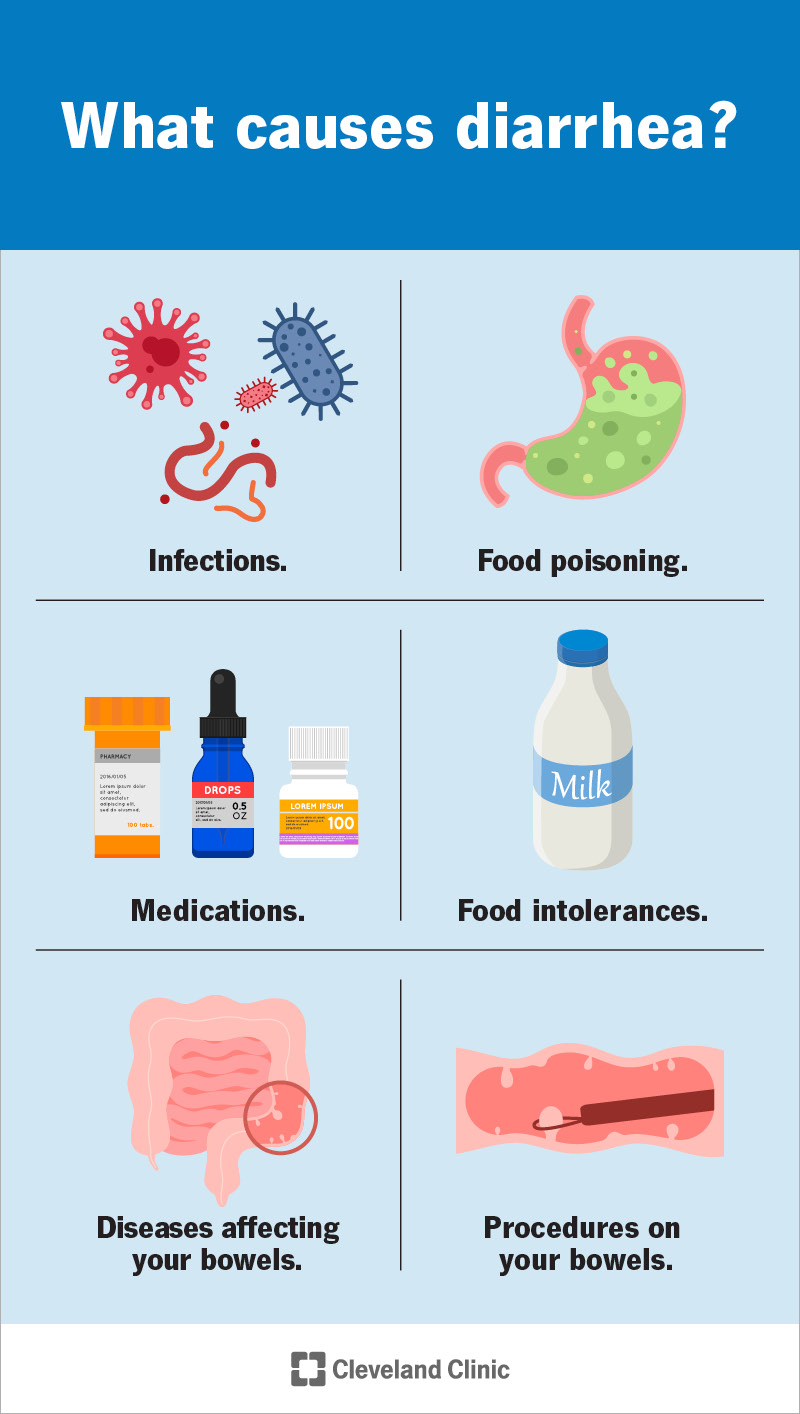Diarrhea means having a loose, watery stool during a bowel movement. It’s common in both children and adults and usually goes away on its own within a few days. If it doesn’t improve or if you’re experiencing other symptoms like a fever or bloody stool, reach out to a provider to get the treatment (and relief) you need.

Diarrhea means having a loose or watery stool (poop). It’s so common that most people flinch when they hear the word. The thought of thin, sickly-looking poop in the toilet bowl never stops feeling unpleasant. If you have diarrhea, not knowing what’s causing it or how long it’ll last only adds stress to the unpleasant feelings.
The good news is that diarrhea is usually mild (only a few bathroom trips a day) and goes away within a few days.
Sometimes, though, diarrhea is a sign of a serious condition. It can cause you to lose too much fluid (dehydration) or prevent you from getting enough nutrients. It’s important to know what to look out for so you know when to see a healthcare provider about diarrhea and when to wait it out.
Diarrhea goes by different names depending on how long it lasts:
It’s incredibly common and affects people of all ages. Most adults get acute diarrhea once a year, while children tend to get it twice a year.
Advertisement
Cleveland Clinic is a non-profit academic medical center. Advertising on our site helps support our mission. We do not endorse non-Cleveland Clinic products or services. Policy
The main cause of diarrhea is a virus that infects your gut (gastroenteritis). Some call it the “stomach flu” or a “stomach bug.” But diarrhea can have lots of causes.
The main sign of diarrhea is loose or watery stool. Other common symptoms include:
These symptoms usually don’t require a provider visit, especially if they only last a few days.
Severe cases of diarrhea may signal a medical condition, like a serious infection, that won’t get better without treatment from a healthcare provider.
Contact your provider if you have diarrhea with:
Contact a provider if you’re experiencing symptoms of dehydration or noticing signs of dehydration in your child, including:
Advertisement
Dehydration is one of the biggest concerns with diarrhea. This is especially true among vulnerable populations (infants, people 65 and older and people with compromised immune systems). Without treatment, dehydration can lead to kidney failure, stroke, heart attack or even death.
Most cases of diarrhea don’t require a diagnosis or treatment. In more severe cases, your provider will work to determine the cause. They’ll ask about your medical history, family medical history, travel history and any sick contacts you may have.
They may order tests, including:
Advertisement
Usually, you can get rid of diarrhea at home. Over-the-counter (OTC) medicines for diarrhea, like bismuth subsalicylate (Pepto-Bismol® or Kaopectate®), often help people feel better quickly. You’ll need to see a healthcare provider for diarrhea that doesn’t improve or that happens alongside symptoms of severe diarrhea.
Your provider may recommend treatments like:
You can often get rid of acute diarrhea through lifestyle changes you can make at home.
Diarrhea can cause your anus (butthole) to feel sore, itchy or like it’s burning. It may hurt to poop. You can ease the pain by sitting in lukewarm water in the bathtub or trying a sitz bath. Pat your anus dry instead of rubbing it when you get out of the water. Applying petroleum jelly or a hemorrhoid cream to your anus can keep it from getting too raw.
Call your child’s pediatrician if they have severe diarrhea. Treatments for diarrhea in children are different from treatments for adults. Over-the-counter medications may be dangerous.
Children are also at a higher risk of dehydration than adults. Your provider will help you determine the best way to keep them hydrated, but options include:
The best option to keep your child hydrated might change as the child gets older. Always check with a provider before giving your child a new liquid or treatment of any kind.
You can’t always prevent diarrhea, but you can reduce your risk of getting it because of infections or food contamination.
Call your healthcare provider if you have diarrhea that doesn’t improve or go away within a few days. Reach out if you have a fever, severe pain and a bloody stool in addition to diarrhea.
See a healthcare provider if you’re experiencing symptoms of dehydration, which can be serious without treatment.
A note from Cleveland Clinic
Going to the bathroom, having a bowel movement, pooping — no matter what you call it, stool is a regular part of life. That’s a big reason why diarrhea is so uncomfortable. It messes up our normal. Usually, diarrhea is a short-term thing that resolves in a few days. If it doesn’t, or if you’re experiencing symptoms of severe diarrhea, contact your healthcare provider. And don’t be embarrassed. Diarrhea is a common condition your provider knows all about. They can advise you on the best ways to get relief fast.
Last reviewed on 09/20/2023.
Learn more about the Health Library and our editorial process.
Advertisement
Cleveland Clinic is a non-profit academic medical center. Advertising on our site helps support our mission. We do not endorse non-Cleveland Clinic products or services. Policy